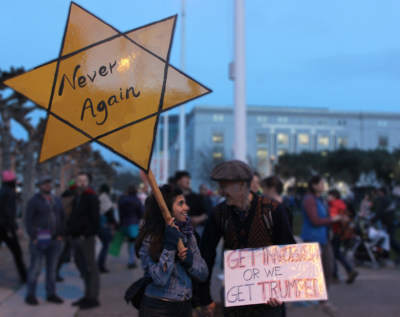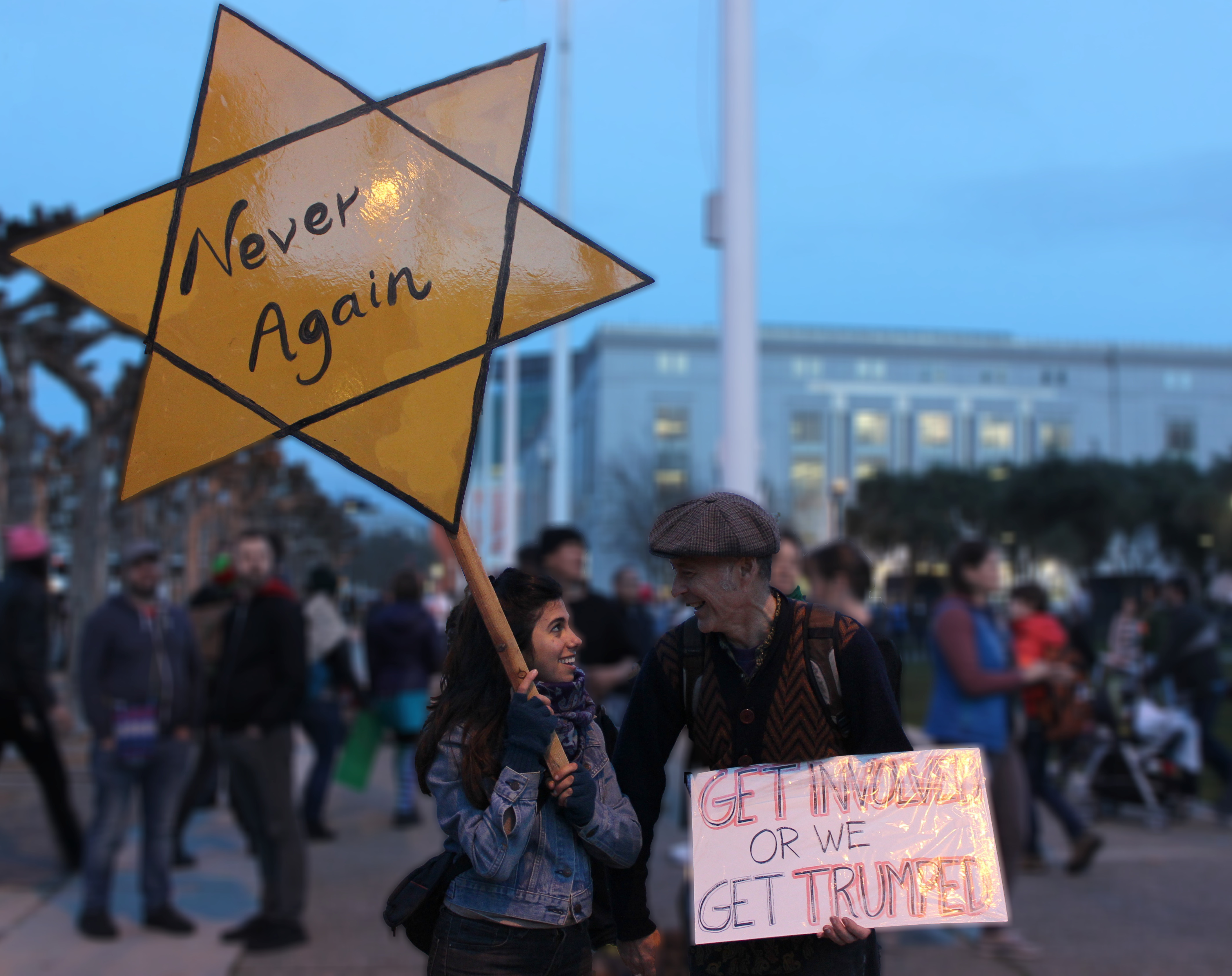Originally published in The Forward.
Watching the events of these past weeks unfold, we were confronted with a feeling of desperation. Nazis rioted in Charlottesville, Virginia, chanting anti-Semitic, anti-immigrant, and anti-Black slogans, threatening a synagogue. The president of the United States sided with racism and violence, drawing praise from the Ku Klux Klan and other white supremacists. The New England Holocaust Memorial, a landmark of our local Jewish community, was vandalized for the second time this summer. Taken all together, the hatred is overwhelming, and inaction seems intolerable. The past few days have left us, as campus Jewish activists, feeling helpless.

But Jewish students aren’t helpless. Historically, we have been on the cutting edge of some of the most transformative grassroots movements in modern Jewish society. And today, we have more resources than ever at our disposal to organize, resist, and fight for change.
Perhaps the most significant grassroots movement in Jewish history was Zionism. Older thinkers like Leon Pinsker wrote the Zionist idea into existence, but students translated his ideas into reality. It was the members of BILU, a Jewish student organization founded in Lithuania, who first committed their bodies to the dream of a Jewish state, writing a charter that appealed to the Turkish sultan and, starting in 1882, making their homes in the Ottoman-occupied land that would later become Israel. Young Jews in Europe, America, and Southwest Asia established activist cells at their schools and in their local communities, taught each other Hebrew language skills and Zionist political literature, raised money to support agricultural communities in Ottoman Palestine, and even smuggled refugees and immigrants across borders. They put their time, bodies, and lives on the line for a revolutionary cause, confronted centuries of anti-Jewish hatred and reactionary Jewish complacency, and eventually built a sovereign Jewish state.
Young Jews in America supported the Civil Rights Movement, participating in the Freedom Rides and other forms of activism. During the 1964 Freedom Summer, between one-third and one-half of all the student volunteers who traveled to the south to educate were Jewish.
Jewish students in the United States were at the forefront of the movement for the liberation of Soviet Jews. They adopted Civil Rights Movement tactics to galvanize a complacent Jewish community, leveraged American public opinion, and moved the American government to action. Once Soviet anti-Semitism became a priority for American politicians, the USSR was confronted on the Jewish issue –- and a million Jews were allowed to flee the Soviet Union as refugees.
Like the activists who pushed for Soviet Jewish liberation, and like the revolutionaries who revived Jewish sovereignty in our homeland, the Jewish students of today can, and must, be pioneers of grassroots organizing. Our work fighting anti-Semitism and around Israel/Palestine is far from complete, but we now must answer a new calling as well. We must draw inspiration from Jewish student activist history for our own work today, taking on the Trump regime and the pillars of hatred and bigotry on which it stands.
What can we, as Jewish student activists, do to affect change? It is not enough to draw abstract inspiration from the past -– we must take concrete action today. To that end, we propose the following ten forms of Jewish action while on campus. Some of these recommendations are more accessible than others, and these ten points do not, by any means, constitute a comprehensive guide, but we hope that these suggestions, rooted in our own experiences, can help you, the reader, to begin thinking about what concrete steps are within your reach.
1) Self-Educate
To be an effective organizer, you need to be aware of both current events and the history that informs today’s world. Read not only newspapers, but also books to gain the deepest possible understanding of the present-day reality. Your campus library probably has books like Hannah Arendt’s The Origins of Totalitarianism or George Orwell’s 1984, and we also strongly recommend Yale historian Timothy Snyder’s new book, On Tyranny: Twenty Lessons from the Twentieth Century. But don’t limit yourself to reading on politics — attempt to understand the experiences of your fellow Americans. Add Ta-Nehisi Coates’ Between the World and Me to your bookshelf, and educate yourself about racism in the prison-industrial complex through Michelle Alexander’s The New Jim Crow.
Further, educate yourself on organizational methods. Think critically about Alinskyite methods, read Marshall Ganz, and utilize modern organizing resources like those at the Ayni Institute.
Lastly, look to your Judaism for anti-oppressive literature. Ideas like tikkun olam (repairing our broken world) and biblical stories of bold resistance against Roman occupiers can serve as great founts of inspiration, and can be woven into dvar Torot (words of Torah commenting on the weekly readings) to help mobilize a Jewish community.
2) Educate Your Community
Exchange ideas and reading material with your fellow students, join (or start) a dialogue group on campus, bring up politics at Shabbat dinner or in your Jewish society’s lounge, attend and arrange lectures, and otherwise seek out and spread the knowledge and inspiration that can best inform your organizing efforts and those of your fellow students. Writing can be a particularly useful tool in spreading ideas and mobilizing your community for action: contribute an op-ed to your campus newspaper, add a call to action in your Hillel newsletter, or compose an independent email with helpful links and updates about pro-justice events on campus to help your friends and your Jewish community stay engaged.
3) Listen
As a Jewish activist, you have a right to be heard on issues related to anti-Semitism. If you are also a member of other marginalized communities, you can speak to those issues as well. No activist, however, has the right to speak on behalf of a community of which they are not a part. It is crucial to be sensitive to the needs of all marginalized people, as defined by the victims themselves. Without thrusting the burden of explaining issues of oppression onto the victims, seek out activists, websites, and other resources that offer explanations or invite questions. Find out from members of different marginalized communities what they need from their allies.
4) Donate and Fundraise
One very direct way that you can make a difference is by contributing financially to important causes. The Southern Poverty Law Center, the Anti-Defamation League, and other such organizations engage in legal and cultural work to confront hate groups and executive overreach. Even if you can’t personally afford to donate, you can organize fundraisers on your campus, including in your Hillel community. Raffles, performances, and donation boxes can earn thousands of dollars for a good cause.
5) Volunteer
As the already-insufficient government support for immigrants, refugees, and struggling families withers, the voluntary work of upstanding citizens becomes ever more important. You can organize members of your Hillel or other Jewish campus communities to volunteer at local institutions that are providing services to which the government is increasingly hostile.
6) Protest
Large-scale protests and rallies, whether against police brutality and structural racism, Islamophobia, problematic immigration policies, misogyny, or any other social or political injustice, have real potential to affect change. They introduce ideas into the mainstream media discourse, demonstrate the popularity of specific policies, and more. As a student, you can participate in marches, attend Black Lives Matter demonstrations, and call on your campus Jewish community to show up.
7) Get Political
The American institution that is perhaps best positioned to confront the president, although thus far it has shied away from doing so, is the United States Congress. Members of Congress are citizens’ most direct line to the government as a whole. One way that you can influence American politics is by organizing your friends on campus, in the Jewish community and elsewhere, for phone-a-thons. Write and share talking points about a particularly important issue or legislative item, call your Senators’ and Representatives’ offices, and make your voices heard.
8) Build Coalitions And Solidarity
While your campus Jewish community is a great place to start your organizing work, it is also important to coordinate with other activists on campus. Reach out to campus leaders, show up to their events, and offer your support and solidarity. Pro-justice work is most effective when it is inclusive and when it is conducted in broad coalitions.
One particularly important element of true solidarity is understanding white privilege in the United States as a system that benefits white or white-passing individuals. The first step to joining the coalition of anti-oppression work is to acknowledge the systems of oppression in American society, and it is important to recognize that many Ashkenazi Jews do, however they identify personally, benefit from this system in significant ways. Only by acknowledging the ways in which we are privileged can we find our place among the myriad groups fighting for justice.
9) Confront Your Friends And Family
It’s easy to scoff at the Nazis on television, but it’s much harder to confront a racist parent, grandparent, cousin, or classmate. Although Jews in the United States consistently and overwhelmingly vote for more progressive candidates, more than 20% of the Jewish vote in 2016 went to Donald Trump, who this week refused to condemn neo-Nazism. Don’t avoid politics with your friends and family members who disagree with you – challenge them to reevaluate their political leanings. You have a better chance than anyone else of influencing the people whom you love and who love you.
10) Take On Anti-Semitism
Because Jews are so often portrayed as powerful, wealthy, and conspiratorial, and because left-wing as well as right-wing movements have a long tradition of anti-Semitism that stretches back as far as the French Revolution, anti-Semitism is often not fully addressed within pro-justice movements. The events of this week, however, serve as an important reminder that anti-Semitism is alive and well, that it underpins white supremacist ideology in the United States, and that the current regime – which seized power with the help of an anti-Semitic campaign advertisement and a voter base teeming with Nazis, which includes within its staff anti-Semites like Sebastian Gorka, and which has yet to appoint an anti-Semitism envoy – is not serious about confronting it. Just as we have a responsibility to take seriously the concerns of other marginalized communities, we also have a right to voice our own concerns, and we should not be shy about insisting that pro-justice movements on our campuses deal seriously with anti-Semitism in all of its forms.
These tactics have been employed by Jewish student activists for decades. They paved the way to the realization of the Zionist dream, to the liberation of Soviet Jewry, and more. Now, they can be our tools, as Jewish students in a rapidly and dangerously changing America, for organizing effective resistance. As the pro-justice movement grows nationwide, Jews must step up and do our part. Jewish students, as we have so many times before, should lead the way.
Benjamin Gladstone is a senior at Brown University and co-president of Students from Israel and America Chat.
Misha Vilenchuk is a recent Master’s graduate from Brandeis University. He volunteers his time with the affiliates of the World Union of Jewish Students (WUJS), most notably as the Interim Chairman of the American Union of Jewish Students (AMUJS).

